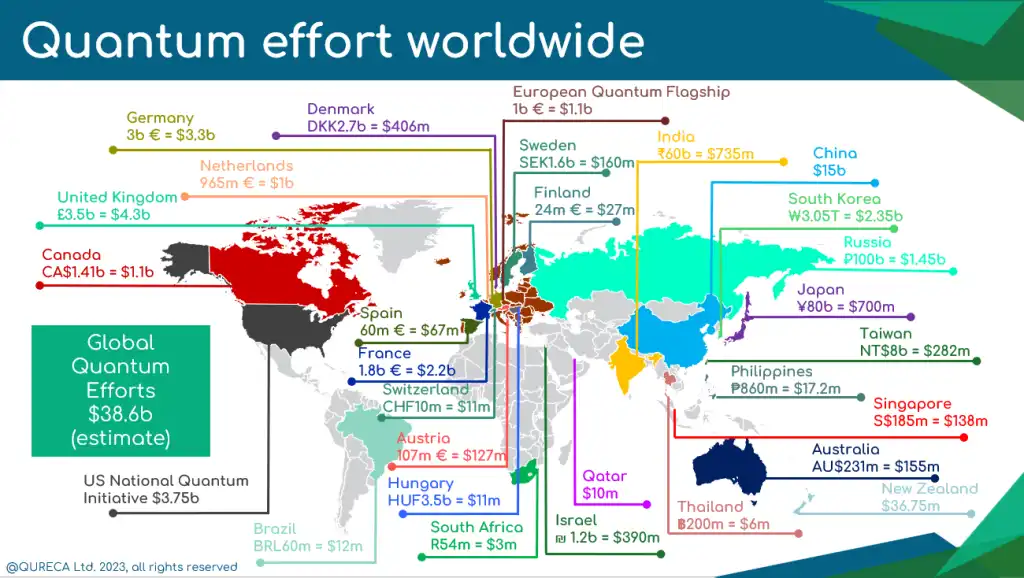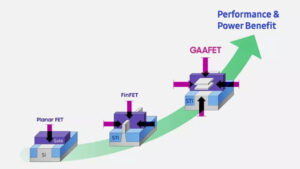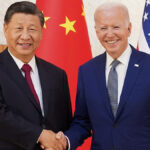Introduction
Quantum computing is one of the most exciting and promising fields of science and technology today. It has the potential to revolutionize many industries and domains, from medicine and finance to cybersecurity and defense. But it also poses a major challenge to the global order, as different countries vie for supremacy in this emerging domain. Who is leading the quantum race, and what are the implications for the world?
Follow us on LinkedIn for everything around Semiconductors & AI
What is Quantum Computing?
Quantum computing is a form of computation. It utilizes the principles of quantum physics. These principles describe the behavior of subatomic particles. Quantum computing performs complex calculations. It does so at extraordinary speeds. Unlike traditional computers, quantum computers use qubits. Qubits can be in a superposition of both values at the same time. This gives them an exponential advantage over classical computers. Quantum computers can process more information. They can solve certain problems. These problems are out of reach for even the most powerful supercomputers.
Who is Leading the Quantum Race?
The quantum race is not just between tech companies, but between nation-states as well. The first country to produce effective, working quantum computers will have a key advantage in economics, defense, and cybersecurity. It will also have an upper hand in establishing market dominance, developing quantum governance models, and pursuing novel quantum applications. The quantum race is especially heated between the U.S. and China, which are the two leading powers in the field. However, other countries, such as India, the EU, Canada, and Australia, are also investing in quantum research and innovation.
United States of America

The U.S. leads in quantum computing. It is home to advanced quantum research institutions and companies. These include IBM, Google, Microsoft, and Amazon. In 2019, Google claimed quantum supremacy. This means performing tasks faster than classical computers. They achieved this with the 53-qubit Sycamore processor.
Additionally, the U.S. boasts a robust private sector ecosystem. It has over 100 quantum-related startups. Moreover, more than 1,000 quantum patents were granted in the last decade. The U.S. government supports quantum research and development.
They passed the National Quantum Initiative Act of 2018. This allocated $1.2 billion for quantum programs over five years.
China

China has a clear edge in quantum communication. It launched the world’s first quantum satellite, Micius, in 2016. This satellite enabled the transmission of quantum-encrypted messages and the demonstration of quantum teleportation.
Moreover, China has built the world’s longest land-based quantum network. It spans over 2,000 kilometers. The country plans to extend this network to a global scale.
China has made significant progress in quantum computing. It has developed several quantum processors. One notable example is Jiuzhang, which achieved quantum advantage in 2020.
Furthermore, China has heavily invested in quantum research and innovation. More than 2,000 quantum patents have been filed. Over 30 quantum startups have been founded in the last decade.
China’s government has also declared quantum technology as a strategic priority. It plans to build a national quantum laboratory and a $10 billion quantum research center.
India

India, meanwhile, is an emerging player in the quantum field, as it has approved its National Mission on Quantum Technologies and Applications in 2023, which allocated Rs.6003.65 crore (about $800 million) for quantum research and development over eight years.
India has also established several quantum research centers and laboratories across the country, such as the Quantum Information and Computation Centre at the Harish-Chandra Research Institute, the Centre for Quantum Technologies at the Indian Institute of Science, and the Centre for Excellence in Quantum Technology at the Indian Institute of Technology Madras. India has also partnered with other countries, such as the U.S., the UK, France, Germany, Japan, and Israel, to exchange expertise and resources in the field of quantum technology.
India has also produced some notable achievements in quantum computing, such as the development of a 12-qubit quantum simulator, SimulQron, by the Indian Institute of Technology Roorkee in 2019. SimulQron is a software tool that allows users to simulate quantum networks and protocols using the NetQASM language.
Other Countries

EU, Canada, and Australia, are also active in the quantum domain, as they have launched their own quantum initiatives and programs to support and accelerate the development and adoption of quantum technologies.
For example, the EU has invested €1 billion in its Quantum Flagship, which aims to create a quantum ecosystem that covers research, industry, education, and policy. The Quantum Flagship funds 21 quantum research projects in various fields, such as communication, simulation, sensing, and computing.
Canada has established the Quantum Canada network, which connects quantum researchers, entrepreneurs, and policymakers across the country. Canada has also partnered with the EU to jointly support three quantum research projects that will facilitate collaboration between Canadian and European researchers.
Australia has developed the Quantum Technology Roadmap, which outlines the opportunities and challenges for quantum technology in Australia, and provides recommendations for strategic actions and investments. They have also established several quantum research centers and institutes, such as the Centre for Quantum Computation and Communication Technology and the ARC Centre of Excellence for Engineered Quantum Systems.
These countries have also contributed to quantum research and innovation, with some of the world’s leading quantum researchers and companies, such as Peter Shor, who proposed the quantum algorithm for factoring large numbers, David Deutsch, who pioneered the field of quantum computation, and D-Wave Systems, which claims to have built the world’s first commercial quantum computer.
Conclusion
Quantum computing is the next frontier of global competition, as it has the potential to transform many aspects of science, technology, and society. The quantum race is not just a matter of scientific curiosity, but a matter of strategic importance, as it could affect the interests and influence of different countries and regions. It’s is not a zero-sum game, but a complex and dynamic game, with multiple players, dimensions, and outcomes. The quantum race is not a foregone conclusion, but a contingent and uncertain process, with many opportunities and challenges, as well as risks and rewards. The quantum race is not a distant future, but a present reality, which requires attention and action from all stakeholders.






